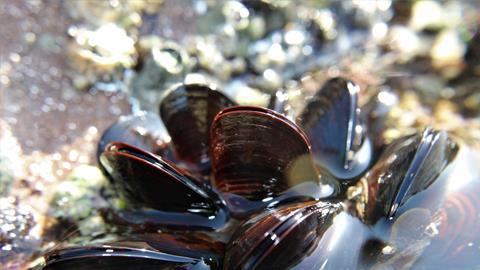Canadian researchers describe in Science the mechanism by which mussels can detach themselves very quickly. This in turn provides new inspiration for reversible adhesives that work well in wet conditions.
The way mussels stick to surfaces has been studied extensively because the mechanism could provide an adhesive for wet conditions. Much of this research has focused on the chemical bonding mechanism of mussel glue, but less attention has been paid to the connections between living mussel tissue and the sticky-terminated filaments by which the mussel attaches itself. However, not only can mussels cling tightly, they can also detach quickly. A group of Canadian researchers now show in Science how the dynamic interface between the mussel and the glue works.
High friction surface
Mussel glue is a biopolymer secreted by mussels. To attach itself, a mussel makes many threads of this polymer, which are all attached to a main thread called the stem. At the point of attachment to living tissue, mussels have cilia, which they can vibrate using neurons. Because there are so many hairs, there is also a lot of friction surface. This allows the mussel to attach itself without the need for strong covalent bonds. You can compare it to two brushes that you push together. You can’t just pull them apart. But if the mussel vibrates all these bristles, the whole bond can be released at once.
‘I’m impressed by the work, it’s difficult to visualise such a dynamic process, especially in such small creatures,’ says Marleen Kamperman, professor of polymer science at the University of Groningen. ‘We just don’t know yet if we can do anything with it. It is part of a wider search for adhesives that can be released on command. We’ve been observing how the mussel makes the adhesive thread for decades, but the mechanism of release is new.’
J. Sivasundarampillai, L. Youssef et al. (2023) Science ‘A strong quick-release biointerface in mussels mediated by serotonergic cilia-based adhesion’ https://doi.org/10.1126/science.adi7401













Nog geen opmerkingen